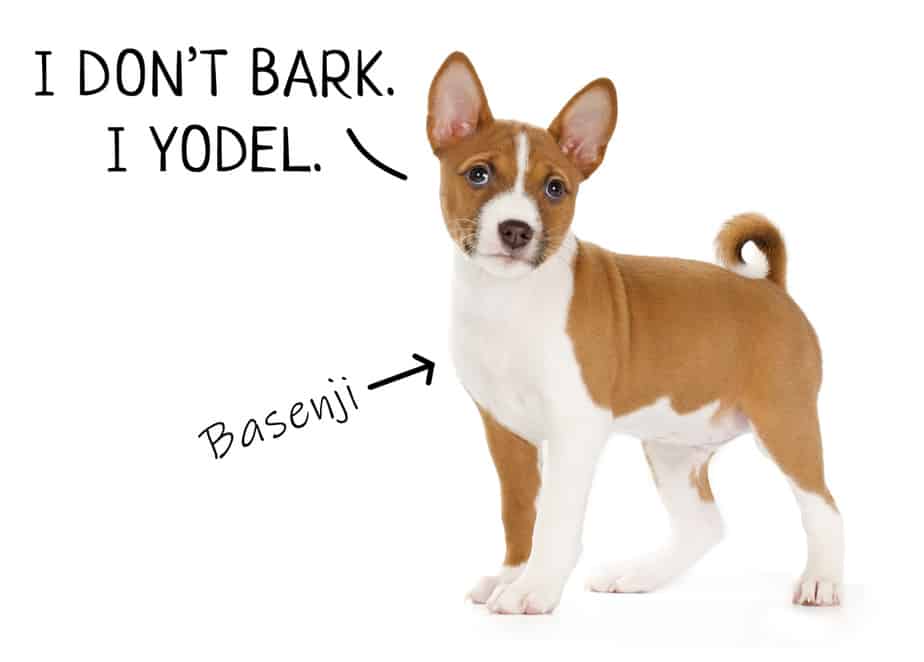Does your puppy rarely bark? Then you may have found yourself a Unicorn, because they’re quite rare. Or is it a matter of time until your puppy unleashes their inner voice?
We’ll take a look at how barking develops in dogs, the reasons dogs bark, and if your dog will bark eventually – or not at all.
When do puppies learn to bark?
When puppies are first born, they not only don’t bark, but they rarely make any other vocalizations, either. It isn’t until puppies are 2-3 weeks old that they may start to whine and vocalize. They don’t actually start to bark in many cases until 6-8 weeks old.
Puppies are born without the ability to hear or see. As their eyes and ears open around 2-3 weeks of age, it makes sense that their vocalizations begin at this time.
They often whine, grunt, and make plenty of other fun puppy sounds as they begin to wrestle with their littermates or let their needs and feelings be heard.
However, the actual barking usually doesn’t start until at least 6-8 weeks of age. Their barks rarely sound like the barks of an adult dog, though, and they may be shrill and yappy instead.

It’s not unusual for dogs of naturally quieter breeds and personalities to not bark until they are 3-4 months old, or even older, though.
Some breeds of dogs less likely to bark include the following:
-
Greyhound
-
Newfoundland
-
Chinook
-
Basinji
-
Coton de Tulear
-
Shar Pei
-
Bullmastiff
-
French Bulldog
-
Shiba Inu
-
Great Dane
-
Irish Setter
If you own one of the above breeds, or your puppy isn’t barking before 3 or 4 months old, there isn’t a problem with your dog. They are simply choosing to communicate in other ways.
The breed, upbringing, and individual personality of a dog play a huge role in determining how loud they will be as an adult.
My dogs, Nova Scotia Duck Tolling Retrievers, are often plenty noisy when wrestling with their siblings as puppies.
However, some adults are pretty quiet dogs overall, and others make a lot of vocalizations, depending on their ancestry.
My younger dog, Hobbes, makes plenty of grunts, groans, woofs, and other sounds to talk back to us throughout the day.
Unique to the Duck Toller breed is the “scream” they make when they are excited. Both my dogs will scream when happy or frustrated, and it often startles those who are unsuspecting.
The Nova Scotia Duck Tolling Retriever breed club describes this sound as if the dog was being fed tail-first into a woodchipper – and it’s quite accurate.
So, while my dogs may not bark frequently, they can still be quite noisy and make plenty of other vocalizations as well, due to their breed.
Shelties, Siberian Huskies, Beagles, and many other breeds are known for being loud and noisy as well.
On the other hand, breeds such as the Greyhound and French Bulldog are often relatively quiet. The Basenji is actually a breed of dog that doesn’t bark at all – instead, they make a sound that is referred to as a yodel.
If barking is a concern for you, and you are still researching which dog is best for you, it’s important to consider breed and ancestry, and the above list are a good starting point of non-barkers.
You can set you and your puppy up for success by choosing a breed that doesn’t usually bark, from parents that are known to be relatively quiet dogs.
Training can go a long ways in helping your dog learn to be quiet as well, but it can’t completely overrule genetics.

Why do dogs bark?
There are a variety of reasons dogs may bark, and it often is an expression of some emotion they are feeling – fear, anxiety, excitement, boredom, frustration – and their desire to try and communicate that feeling.
They may be attempting to communicate with you, their owner, as in the case of boredom barking. This often occurs when a dog has not had the physical or mental stimulation they need.
You’ll find a bored dog staring at their owner and barking, asking them to please go on a walk or play a fun game!
Other times, a dog may be barking out of a window at a squirrel or another dog walking by their home. Depending on the context, it may be due to frustration because they want to play with the dog, or fear, as they dislike other dogs.
In order to determine why a dog is barking, you’ll want to look at their body language.
A fearful dog is going to display fearful body language, such as yawning, licking their lips, or making attempts to get away.
In many cases, a fearful dog may turn to an aggressive display when pushed too far.
Excited dogs will often be loose and wiggly, making plenty of short and small movements, and have a relaxed face.
As you get to know your puppy, you’ll likely be able to tell their feelings from their body movements alone, instead of relying on a bark.
In fact, I often recommend to people who are learning dog body language to watch videos of dogs without the sound and try to figure out what the dogs are saying.
Barks and growls can occur for such a wide variety of reasons that you shouldn’t rely on vocalizations alone to determine a dog’s feelings.

Will my puppy ever bark?
Most dogs will bark at some point in their lives. If you have a quieter puppy, you can consider yourself lucky!
There are many other dog owners who would love to have a quieter family member than their current dog.
However, your dog may not feel the need to communicate anything with barking yet – or ever. Dogs rely heavily on body language to communicate with each other.
Barking usually only occurs in dogs that are too excited, too frustrated, too bored, or too fearful to react otherwise.
Instead, if your puppy hasn’t been put in a situation in which they have extreme feelings, they may feel perfectly comfortable using body language alone to communicate.
You can check out the great resources over at iSpeakDog for more information on reading your dog’s body language.
If you want your puppy to bark, you can sometimes illicit them to bark by playing a fun and exciting game with them.
You shouldn’t ever tease, scare, or frustrate your puppy into barking, though.
Not only is it unfair to the dog, but it can create more problems. Your puppy may develop a new fear or frustration that carries over into the rest of their life.
Your goal as you raise a young puppy should be to help them become comfortable with the world, relaxed in a variety of situations, and confident.
Teaching them to bark is not necessary, and you may set yourself up for more problems in the future.
Sometimes, once a puppy finds their voice, it’s hard for them to learn to be quiet again!
It may be cute to hear your puppy find their voice and bark for the first time, but you should make sure you don’t let them carry on and on forever.
An occasional bark of playfulness or a bark of warning is OK in most cases, but a persistent barker is often over threshold and needs help to regulate their emotions so they can be comfortable and calm again.
Is it bad that my puppy doesn’t bark?
In general, no. Your puppy does not have to bark to be a fulfilled dog, and they aren’t missing out. Dogs communicate mostly with their body language than with their voices, so they should be able to get along with other dogs just fine.
However, if you are worried that your puppy isn’t barking because they are lethargic, listless, and sick, it is time to take your puppy to the veterinary clinic.
You may first notice them being lethargic and sick if they would usually bark at something, and now, it doesn’t seem to even get them to get up and investigate.
Not barking by itself isn’t a sign of illness. However, lethargy, depression, and other signs and symptoms of sickness mean that your puppy should be seen by a veterinary professional




